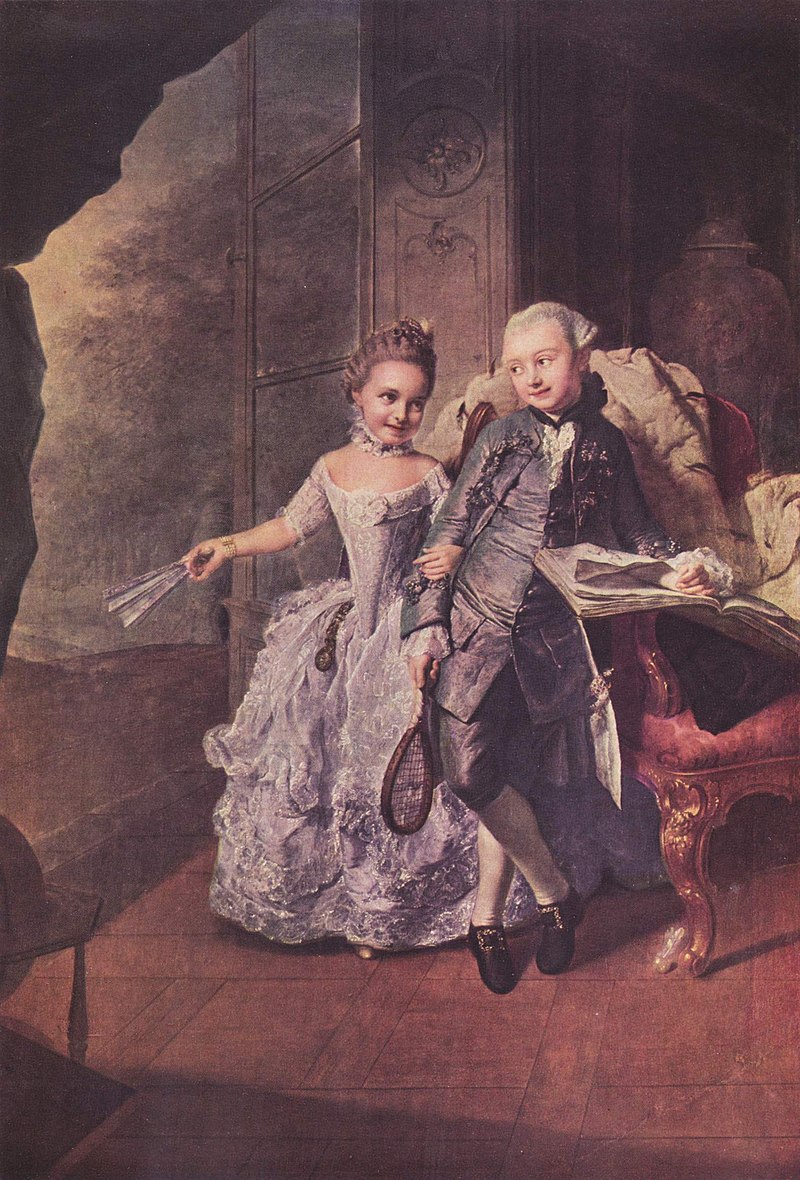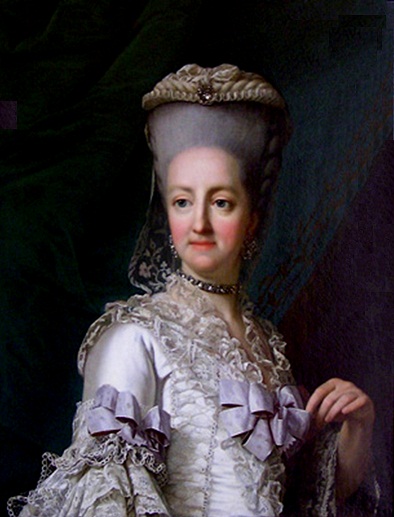by Susan Flantzer
© Unofficial Royalty 2023

Sophia Friederike of Mecklenburg-Schwerin, Hereditary Princess of Denmark and Norway; Credit – Wikipedia
Sophia Friederike of Mecklenburg-Schwerin, Hereditary Princess of Denmark and Norway, the mother of King Christian VIII of Denmark, was born on August 24, 1758, in Schwerin, Duchy of Mecklenburg-Schwerin, now in the German state of Mecklenburg-Vorpommern. She was the second of the two children and the only daughter of Ludwig, Hereditary Prince of Mecklenburg-Schwerin and Princess Charlotte Sophie of Saxe-Coburg-Saalfeld. Sophia Friederike’s paternal grandparents were Christian Ludwig II, Duke of Mecklenburg-Schwerin and Duchess Gustave Caroline of Mecklenburg-Strelitz. Her maternal grandparents were Franz Josias, Duke of Saxe-Coburg-Saalfeld and Anna Sophie of Schwarzburg-Rudolstadt.

Sophie Friederike with her brother Friedrich Franz, 1764; Credit – Wikipedia
Sophia Friederike had one older brother:
- Friedrich Franz I, the first Grand Duke of Mecklenburg-Schwerin (1756 – 1837), married Princess Louise of Saxe-Gotha-Altenburg, had eight children including Charlotte Frederica of Mecklenburg-Schwerin, Hereditary Princess of Denmark, the divorced first wife of her first cousin King Christian VIII of Denmark and the mother of King Frederik VII of Denmark

Hereditary Prince Frederik of Denmark and Norway; Credit – Wikipedia
On October 21, 1774, 16-year-old Sophia Friederike married 21-year-old Hereditary Prince Frederik of Denmark and Norway, the only child of King Frederik V of Denmark and Norway and his second wife Juliana Maria of Brunswick-Wolfenbüttel. When Sophia Friederike first met Frederik, she was disappointed by his less favorable appearance. She had difficulty settling at the Danish court and repeatedly complained of its dullness. Although the couple eventually became fond of each other, they both had lovers, and the father of Sophia Friederike’s children was rumored to be her husband’s adjutant Frederik von Blücher (link in Danish).

Sophia Friederike and Frederik with their three eldest surviving children Christian, Juliane, and Louise; Credit – Wikipedia
Sophia Friederike and Frederik had two stillborn daughters before the birth of their five children. Through their daughter Louise Charlotte, they are the ancestors of the Belgian, British, Danish, Luxembourg, Norwegian, and Spanish royal families and the former royal families of Greece and Romania.
- Princess Juliana Marie of Denmark (born and died 1784), died in infancy
- King Christian VIII of Denmark (1786 – 1848), married (1) his first cousin Charlotte Frederica of Mecklenburg-Schwerin, divorced, had one son King Frederik VII of Denmark (2) Caroline Amalie of Schleswig-Holstein-Sonderburg-Augustenburg, no children
- Princess Juliane Sophia of Denmark (1788 – 1850), married Landgrave Wilhelm of Hesse-Philippsthal-Barchfeld (link in German), no children
- Princess Louise Charlotte of Denmark (1789 – 1864), married Prince Wilhelm of Hesse-Kassel, had six children including Princess Louise of Hesse-Kassel who married King Christian IX of Denmark, the current Danish royal family descends from this marriage as do the Belgian, British, Luxembourg, Norwegian, and Spanish royal families and the former royal families of Greece and Romania
- Hereditary Prince Ferdinand of Denmark (1792 – 1863), heir presumptive to the Danish throne from 1848 until his death, married his first cousin once removed Princess Caroline of Denmark, the elder of the two daughters of King Frederik VI of Denmark, no children

Frederik’s elder half-brother King Christian VII of Denmark; Credit – Wikipedia
At the time of the marriage, Frederik’s elder half-brother Christian VII, the son of King Frederik V of Denmark and Norway and his first wife, Princess Louisa of Great Britain, was King of Denmark and Norway. Soon after Christian VII’s succession, it became clear that he was not quite normal. It is unknown if Christian’s mental illness was caused by the brutal childhood treatment of his governor Christian Ditlev Reventlow, Count of Reventlow, possible porphyria inherited from his Hanover mother, or schizophrenia. Christian’s symptoms included paranoia, self-mutilation, and hallucinations. It was becoming clearer and clearer that Christian could not fulfill his role as king. Eventually, as a result of King Christian VII’s mental illness, Sophia Friederike’s husband Frederik and his mother Queen Dowager Juliana Maria became involved in major political manipulations. Their actions, of course, would affect Sophia Friederike and her status in the Danish royal family.

Sophia Friederike’s mother-in-law Juliana Maria of Brunswick-Wolfenbüttel, Queen Dowager of Denmark and Norway; Credit – Wikipedia
On a trip arranged for Christian because it was believed that new environments could change King Christian VII’s behavior, Christian became acquainted with the physician Johann Friedrich Struensee. Struensee was the first person who understood that Christian was seriously ill. When Christian came home from the trip, Struensee accompanied him and was employed as Christian’s personal physician. Because of Christian’s confidence in him, Struensee gained political power. He also became the lover of Christian VII’s ill-treated wife, born Princess Caroline Matilda of Wales, whose marriage was less than satisfactory. When Caroline Matilda gave birth to her daughter Louise, no one doubted that Struensee was Louise’s father. In 1772, Frederik’s mother, Queen Dowager Juliana Maria, maneuvered a coup that would bring about the fall of Struensee and discredit Caroline Matilda. Juliana Maria arranged for King Christian VII to sign Struensee’s arrest warrant after Struensee had been in the king’s name. Struensee was executed and Caroline Matilda was exiled for the rest of her life.
After the fall of Struensee, Frederik and his mother Juliana Maria took charge of the Council of State. Christian VII was only nominally king from 1772 onward. Crown Prince Frederik (the future King Frederik VI), King Christian VII’s son, had no intention of allowing his uncle Frederik and his stepgrandmother Juliana Maria to continue their rule. In 1784, Crown Prince Frederik reached the age of legal majority and then ruled permanently as Prince Regent. He somehow managed to get his insane father to sign an order dismissing the supporters of his Frederik and Juliana Maria’s supporters from the Council of State and declaring that no royal order was legal unless co-signed by the Crown Prince, thereby deposing Frederik and Juliana Maria. After losing power, Frederik’s political career ended, his family’s status in the Danish royal family was greatly diminished, and he and Sophia Friederike lived as private people for the rest of their lives.

Roskilde Cathedral; Photo © Susan Flantzer
On November 29, 1794, Sophia Friederike, aged thirty-six, died at Sorgenfri Palace in Kongens Lyngby, Denmark, north of Copenhagen. She was buried at Roskilde Cathedral in Roskilde, Denmark, the traditional burial site of the Danish royal family. Hereditary Prince Frederik survived his wife by eleven years, dying at Amalienborg in Copenhagen, Denmark on December 7, 1805, at the age of 52. He also was buried at Roskilde Cathedral. Because King Frederick VI, Frederik’s nephew, the son of his half-brother King Christian VII, had two daughters but no sons, upon his death in 1839, he was succeeded by the son of Sophia Friederike and Frederik, King Christian VIII.
This article is the intellectual property of Unofficial Royalty and is NOT TO BE COPIED, EDITED, OR POSTED IN ANY FORM ON ANOTHER WEBSITE under any circumstances. It is permissible to use a link that directs to Unofficial Royalty.
Works Cited
- Da.wikipedia.org. (2018). Arveprins Frederik. [online] Available at: https://da.wikipedia.org/wiki/Arveprins_Frederik [Accessed 01 Jun. 2023].
- Da.wikipedia.org. (2018). Sophie Frederikke af Mecklenburg-Schwerin. [online] Available at: https://da.wikipedia.org/wiki/Sophie_Frederikke_af_Mecklenburg-Schwerin [Accessed 01 Jun. 2023].
- En.wikipedia.org. (2018). Duchess Sophia Frederica of Mecklenburg-Schwerin. [online] Available at: https://en.wikipedia.org/wiki/Duchess_Sophia_Frederica_of_Mecklenburg-Schwerin [Accessed 01 Jun. 2023].
- En.wikipedia.org. (2018). Frederick, Hereditary Prince of Denmark. [online] Available at: https://en.wikipedia.org/wiki/Frederick,_Hereditary_Prince_of_Denmark [Accessed 1 Jun. 2023].
- Flantzer, Susan. (2019) Frederik, Hereditary Prince of Denmark and Norway, Unofficial Royalty. Available at: https://www.unofficialroyalty.com/frederik-hereditary-prince-of-denmark/ (Accessed: 01 June 2023).
- Flantzer, Susan. (2017). Juliana Maria of Brunswick-Wolfenbüttel, Queen of Denmark. [online] Unofficial Royalty. Available at: https://www.unofficialroyalty.com/juliana-maria-of-brunswick-wolfenbuttel-bevern-queen-of-denmark/ [Accessed 01 Jun. 2023].
- Ludwig, Hereditary Prince of Mecklenburg-Schwerin (2023) Wikipedia. Available at: https://en.wikipedia.org/wiki/Ludwig,_Hereditary_Prince_of_Mecklenburg-Schwerin (Accessed: 01 June 2023).
